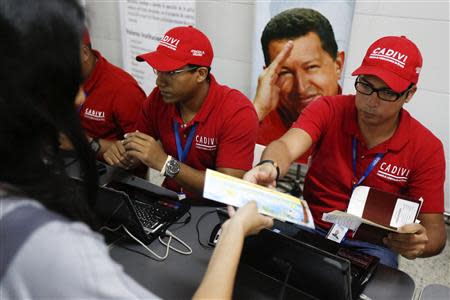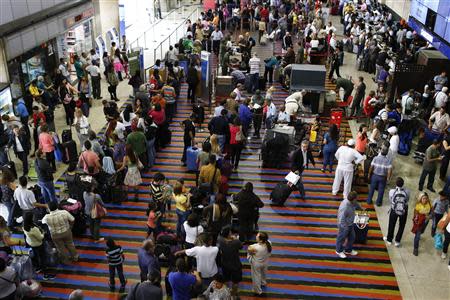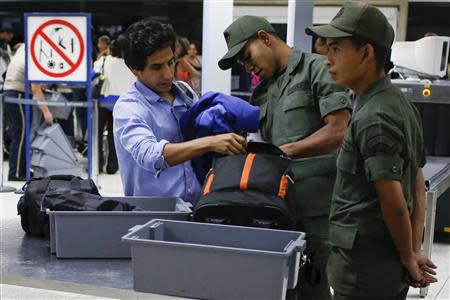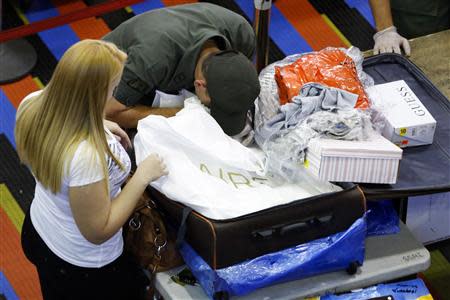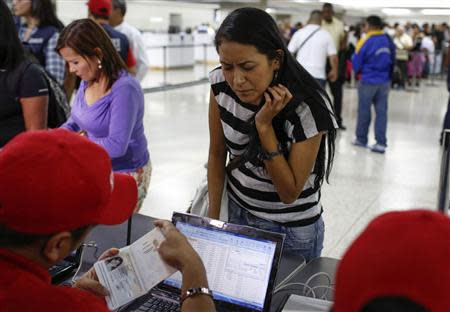Venezuela authorities hunt 'currency tourists'
By Eyanir Chinea CARACAS (Reuters) - In the immigration area of Venezuela's biggest airport, about a dozen officials in red T-shirts and baseball caps randomly check passengers leaving the country. The officials are not guards or police: they are bureaucrats at state currency board Cadivi investigating whether travelers' documents match their requests for hard-to-get dollars. The new checks, launched this month, have contributed to infuriating, hours-long queues at the Simon Bolivar international airport, which serves Caracas, Venezuela's capital. "Unfortunately, people are always going to try and beat the system," said photographer Francisco Blanco, looking irritated in a slow-moving queue before his flight to Paris. "The problem is that we still have currency controls. So there are a lot of tricks going on. And with the black market price of the dollar so high, it's difficult to stop them." So-called "currency tourism" has become a major problem for President Nicolas Maduro's socialist government as Venezuelans make profits using a play on the South American country's tightly regulated foreign exchange system. There are strict limits on the availability of dollars at the official rate of 6.3 bolivars per dollar. But with an airline ticket, an individual can exchange Venezuelan bolivars for up to $3,000 at that rate. Many of those greenbacks are diverted for sale on the black market, where each dollar can fetch about seven times the official rate. The farther away the traveler's destination, the higher the allocation of dollars, meaning there is also a trade in illegal tickets to fool Cadivi when dollar requests are made. "We're very rigorous on the authenticity of tickets," said Cadivi security manager Rafael Marfisi as a line of travelers hurried to have their details checked in a computerized database. "Many people tell Cadivi they're going to destinations such as Costa Rica, Peru and Ecuador. And then they travel to closer places such as Panama, Aruba or Curacao." A trip within the Caribbean entitles a Venezuelan to buy up to $1,000 from the government at the official rate, while Peru warrants the maximum allocation of $3,000. CHAVEZ-ERA CONTROLS A decade of currency controls, first put in place by late leader Hugo Chavez, has largely failed to reduce capital flight and inflation. Venezuela's economy is beset by shortages of consumer goods, and annual inflation rose to almost 50 percent last month. The checks take place after travelers have passed through security and before they reach the airport's passport desks. The operation is a pilot program ordered by Maduro, who has vowed to crack down on currency tourism, which he says is part of an "economic war" being waged against his government. "We've discovered people who ask for dollars on behalf of juveniles, and then later their children don't board the plane," Marfisi said. While there with a group of journalists, his team identified four travelers whose requests for dollars did not tally with their records. Such cases are forwarded to state prosecutors, who will then decide whether to bring illegal currency exchange charges that could result in a fine or up to seven years in prison. Staff at the airport who normally search for illicit substances and contraband also now have the right to search a traveler's wallet or purse for dollars, or credit cards in the names of friends of relatives. Amid the grumbles and long faces in the queue, some were supportive of the crackdown. "The Cadivi coupon should not be transferable, and state resources must be used for education, sports or tourism purposes," said Wolfgang Mejias, a professional fencer, as he waited for a flight to Europe. "It doesn't bother me if they check me or ask questions." The government plans to introduce fingerprint scanners to examine departing Venezuelans' credentials even more closely. (Writing by Daniel Wallis; Editing by Steve Orlofsky)

